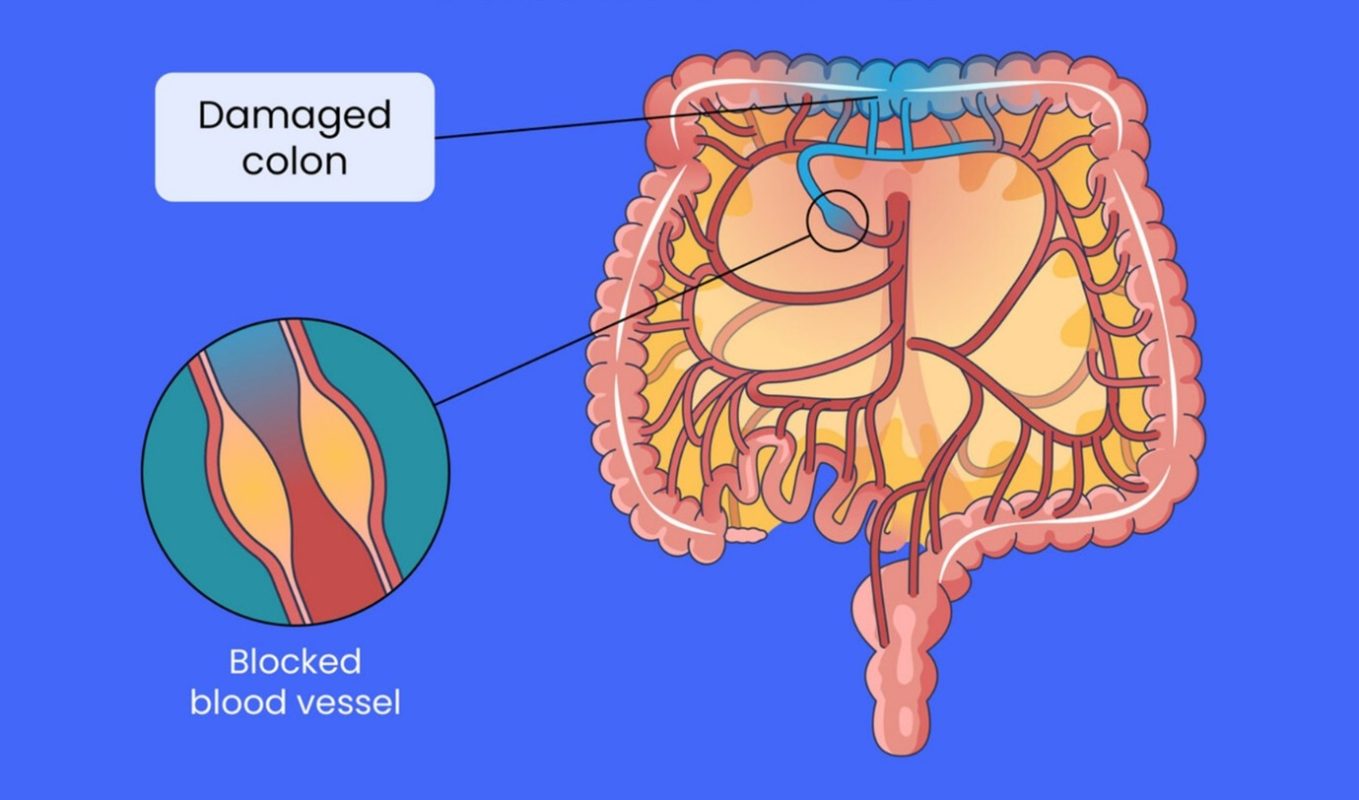"Do you know: Severe abdominal pain accompanied by bloody diarrhea may be a warning sign. ischemic colitis – a dangerous disease but little known? This article will help you understand the causes, timely handling, and prevention of life-threatening complications!
1. What is ischemic colitis?
Ischemic colitis occurs when the blood vessels supplying the large intestine are temporarily "blocked," similar to a water pipe being clogged. At this time, the intestinal cells do not receive enough oxygen, leading to swelling, pain, and damage that can even result in necrosis of that segment of the intestine.
The causes are usually due to narrowed blood vessels (such as: blood clots, fat accumulation, etc.) or a sudden drop in blood pressure due to dehydration, heart disease... Usually, the pain often appears on the left side of the abdomen, however, any segment of the intestine can be affected.
This disease is very easy to confuse with common colitis or food poisoningThe doctor may prescribe antibiotics, pain relievers, or surgery if the intestines are necrotic. Fortunately, most mild cases will resolve on their own after 2-3 days with proper rest. However, if you notice severe abdominal pain and bloody diarrhea, you need to go to the hospital immediately – any delay could lead to a ruptured bowel or a life-threatening infection!
2. 5 signs to identify
✅ Severe pain in the left side of the abdomen: Painful like a knife stab, not relieved when resting.
✅ Having blood in stool: Bright red or dark brown blood, which may be mixed in the stool or appear as blood.
✅ Nauseous, dizzy: Accompanied by fatigue, sweating.
✅ Continuous diarrhea: Going to the bathroom many times, loose stools.
✅ To give birth: The feeling of needing to defecate right now.
Ischemic colitis causing pain in the right flank has a higher risk of serious complications compared to pain in the left abdomen. People with colitis often have a history of multiple associated conditions such as hypertension, atrial fibrillation, and kidney disease, resulting in a higher risk of surgery and a higher risk of death.
3. Who is most susceptible?
There are several factors that may increase the risk of ischemic colitis:
- Elderly people (over 60): Atherosclerotic blood vessels, prone to blockage.
- People with low blood pressure are often associated with conditions such as dehydration, heart failure, surgery, injury, or shock.
- A person with a history of abdominal surgery: Intestinal obstruction due to hernia, scar tissue, or tumor.
- Surgery related to the heart or blood vessels, or the digestive system or gynecology.
- Patients have a history of diseases causing anemia such as: lupus, sickle cell anemia, vasculitis, Leiden factor V disorder, ...
- Users of contraceptives and cardiovascular drugs: Some medications cause blood vessel constriction.
- Marathon runner: Overtraining causes blood to flow to the muscles, leading to a lack of blood supply to the intestines.
- Patients with colon cancer: rare
4. Dangerous complications if treatment is delayed
- Intestinal necrosis: Surgery is required to remove the damaged section of the intestine.
- Stomach ache: Causing peritonitis, sepsis.
- Intestinal obstruction: Severe abdominal pain, high risk of death
5. Effective prevention methods
💧 Drink enough 2 liters of water per day: Keep the blood vessels circulating well.
🚴 Gentle exercise: Walk 30 minutes a day instead of over-exercising.
🚭 Stay away from cigarettes, alcohol, and beer: The cause of arteriosclerosis.
🏥 Regular health check-up: Especially if you are over 50 years old or have heart disease.
The condition of abdominal pain causing discomfort to the point where one cannot sit still or find a comfortable position is a case of acute abdominal pain that requires assistance from healthcare personnel. Early diagnosis and treatment can help prevent serious complications.
#IschemicColitis #GastrointestinalDisorder #SevereAbdominalPain #BloodInStool #NgườiBệnhTimMạch

